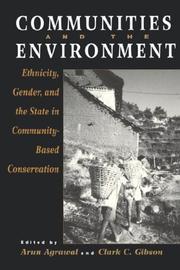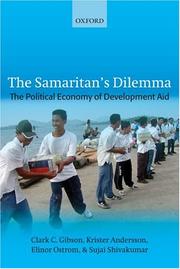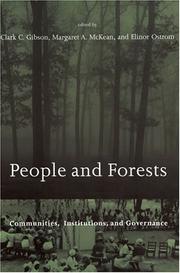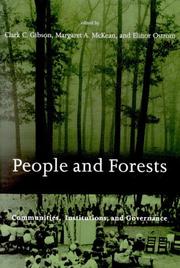| Listing 1 - 8 of 8 |
Sort by
|

ISBN: 0511824874 0511625642 0521623855 0521663784 Year: 1999 Publisher: Cambridge : Cambridge University Press,
Abstract | Keywords | Export | Availability | Bookmark
 Loading...
Loading...Choose an application
- Reference Manager
- EndNote
- RefWorks (Direct export to RefWorks)
Although wildlife fascinates citizens of industrialized countries, little is known about the politics of wildlife policy in Africa. In this innovative book, Clark Gibson challenges the rhetoric of television documentaries and conservation organizations to explore the politics behind the creation and change of wildlife policy in Africa. This book examines what Clark views as a central puzzle in the debate: Why do African governments create policies that apparently fail to protect wildlife? Moving beyond explanations of bureaucratic inefficiency and corrupt dictatorships, Gibson argues that biologically disastrous policies are retained because they meet the distributive goals of politicians and bureaucrats. Using evidence from Zambia, Kenya, and Zimbabwe, Gibson shows how institutions encourage politicians and bureaucrats to construct wildlife policies that further their own interests. Different configurations of electoral laws, legislatures, party structures, interest groups, and traditional authorities in each country shape the choices of policymakers - many of which are not consonant with conservation. This book will appeal to students of institutions, comparative politics, natural resource policymaking, African politics, and wildlife conservationists.
Wildlife conservation --- Animal conservation --- Animals --- Conservation of wildlife --- Preservation of wildlife --- Protection of wildlife --- Species conservation --- Species preservation --- Species protection --- Wildlife preservation --- Wildlife protection --- Wildlife resources conservation --- Wildlife resources preservation --- Wildlife resources protection --- Conservation of natural resources --- Nature conservation --- Endangered species --- Wildlife management --- Government policy --- Economic aspects --- Conservation --- Social Sciences --- Political Science
Book
ISBN: 9780511625640 9780521623858 9780521663786 Year: 1999 Publisher: Cambridge Cambridge University Press
Abstract | Keywords | Export | Availability | Bookmark
 Loading...
Loading...Choose an application
- Reference Manager
- EndNote
- RefWorks (Direct export to RefWorks)

ISBN: 9780813529141 081352914X 0813529131 Year: 2001 Publisher: New Brunswick, NJ : Rutgers University Press,
Abstract | Keywords | Export | Availability | Bookmark
 Loading...
Loading...Choose an application
- Reference Manager
- EndNote
- RefWorks (Direct export to RefWorks)
Nature --- Conservation des ressources naturelles --- Politique de l'environnement --- Communauté. --- Protection --- Participation des citoyens. --- Aspect social.

ISBN: 0199278849 9780199278848 0199278857 9780199278855 1280907819 9786612199523 0191535338 1435623770 1282199528 9786610907816 Year: 2005 Publisher: Oxford Oxford University Press
Abstract | Keywords | Export | Availability | Bookmark
 Loading...
Loading...Choose an application
- Reference Manager
- EndNote
- RefWorks (Direct export to RefWorks)
What's wrong with foreign aid? Many policymakers, aid practitioners, and scholars have called into question its ability to increase economic growth, alleviate poverty, or promote social development. At the macro level, only tenuous links between development aid and improved living conditions have been found. At the micro level, only a few programs outlast donor support and even fewer appear to achieve lasting improvements. The authors of this book argue that much of aid's failure is related to the institutions that structure its delivery. These institutions govern the complex relationships bet
Development aid. Development cooperation --- Economic assistance. --- Economic development --- Economic development projects. --- Economic assistance --- Economic development projects --- Research. --- Research --- #SBIB:327.4H74 --- Ontwikkelingshulp en -samenwerking --- Development, Economic --- Economic growth --- Growth, Economic --- Economic policy --- Economics --- Statics and dynamics (Social sciences) --- Development economics --- Resource curse --- Development projects, Economic --- Projects, Economic development --- Technical assistance --- Economic aid --- Foreign aid program --- Foreign assistance --- Grants-in-aid, International --- International economic assistance --- International grants-in-aid --- International economic relations --- Conditionality (International relations) --- E-books

ISBN: 0262072017 0262571374 9780262072014 9780262571371 Year: 2000 Publisher: Cambridge, Mass. MIT Press
Abstract | Keywords | Export | Availability | Bookmark
 Loading...
Loading...Choose an application
- Reference Manager
- EndNote
- RefWorks (Direct export to RefWorks)
Sociology of environment --- Forestry --- Forest management --- Forestry and community --- Social aspects --- Forestry and community. --- Social aspects. --- Forest management - Social aspects

ISBN: 0262273802 0585435375 9780262273800 0262571374 9780262571371 9780585435374 9780262072014 0262072017 Year: 2000 Publisher: Cambridge, Mass. MIT Press
Abstract | Keywords | Export | Availability | Bookmark
 Loading...
Loading...Choose an application
- Reference Manager
- EndNote
- RefWorks (Direct export to RefWorks)
Unplanned deforestation, which is occurring at unsustainable rates in many parts of the world, can cause significant hardships for rural communities by destroying critical stocks of fuel, fodder, food, and building materials. It can also have profound regional and global consequences by contributing to biodiversity loss, erosion, floods, lowered water tables, and climate change. People and Forests explores the complex interactions between local communities and their forests. It focuses on the rules by which communities govern and manage their forest resources. As part of the International Forestry Resources and Institutions research program, each of the contributors employs the same systematic, comparative, and interdisciplinary methods to examine why some people use their forests sustainably while others do not. The case studies come from fieldwork in Bolivia, Ecuador, India, Nepal, and Uganda. People and Forests offers policymakers a sophisticated view of local forest management from which to develop policy options and offers biophysical and social scientists a better understanding of the linkages between residents, local institutions, and forests.ContributorsArun Agrawal, Abwoli Y. Banana, C. Dustin Becker, Clark C. Gibson, William Gombya-Ssembajjwe, Rosario Leon, Margaret A. McKean, Elinor Ostrom, Charles M. Schweik, George Varughese, Mary Beth Wertime
Digital
Year: 2014 Publisher: Cambridge, Mass. National Bureau of Economic Research
Abstract | Keywords | Export | Availability | Bookmark
 Loading...
Loading...Choose an application
- Reference Manager
- EndNote
- RefWorks (Direct export to RefWorks)
International development agencies invest heavily in institution building in fragile states, including expensive interventions to support democratic elections. Yet little evidence exists on whether elections enhance the domestic legitimacy of governments. Using the random assignment of an innovative election fraud-reducing intervention in Afghanistan, we find that decreasing electoral misconduct improves multiple survey measures of attitudes toward government, including: (1) whether Afghanistan is a democracy; (2) whether the police should resolve disputes; (3) whether members of parliament provide services; and (4) willingness to report insurgent behavior to security forces.
Digital
ISBN: 9158688366 Year: 2001 Publisher: Stockholm Sida
Abstract | Keywords | Export | Availability | Bookmark
 Loading...
Loading...Choose an application
- Reference Manager
- EndNote
- RefWorks (Direct export to RefWorks)
Social costs. Social benefits --- Development aid. Development cooperation --- Developing countries --- Sweden
| Listing 1 - 8 of 8 |
Sort by
|

 Search
Search Feedback
Feedback About UniCat
About UniCat  Help
Help News
News